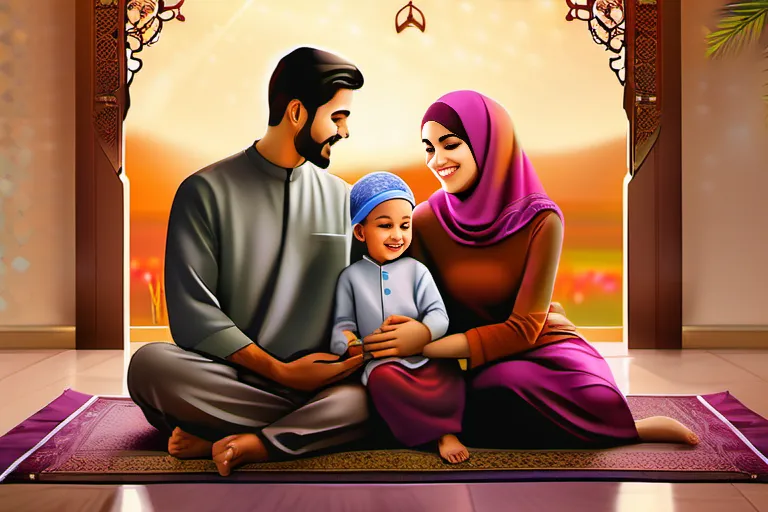Explore the role, values, and structure of family in Islamic society.
Family plays a central role in the Islamic faith. This article delves into the significance of family in Islam, discussing its values, structure, and the responsibilities of its members. From the importance of kinship to the concept of extended families, we’ll cover it all.
The Islamic Concept of Family
The concept of family in Islam is deeply intertwined with the very fabric of society and spirituality. Could it be that the family, as defined in Islamic teachings, serves as a microcosm of the broader community?
In Islam, a family is not just a gathering of individuals; it is a living embodiment of ummah, or the global Muslim community. Each member plays a vital role, much like the pieces of a puzzle coming together to form a cohesive whole.
The sanctity and importance of family in Islam are highlighted through numerous verses in the Quran. For instance, Surah An-Nisa (4:1) emphasizes the responsibilities of men towards their families, while Surah Al-Imran (3:195) stresses mutual respect and kindness among family members.
One cannot overstate the role of marriage in Islam. It is seen as a sacred bond between two individuals who pledge to support and nurture each other. The Prophet Muhammad (PBUH) said, ‘The best among you are those who treat their women well.’ This quote underscores the importance of respect within marital relations.
In Islamic teachings, love, patience, and tolerance are fundamental virtues that strengthen family ties. Imagine a garden where each plant grows and thrives because it receives the necessary care and support—this is what an ideal Islamic family looks like.
The concept of respect extends beyond just spouses; children are taught to honor their parents, while elders are expected to guide and nurture younger generations. This hierarchical respect forms a natural order within the family unit, ensuring stability and mutual care.
Obedience, too, plays a crucial role in maintaining harmony. While respecting one’s rights is important, so is following guidance from parents and elders who are seen as guardians of wisdom and knowledge. This dynamic fosters a sense of unity and shared purpose within the family.
Islamic Values and Family Structure
Imagine a family as a ship, sailing through life’s tumultuous waters, guided by the Quran and Sunnah. In Islam, the values that shape these families are akin to the sturdy ropes that hold the ship together: love, respect, and obedience.
Love in an Islamic family is not just about feeling; it’s a duty and a responsibility. It’s about embracing every member with warmth and kindness. How can we show this love without spending time with our family? Can we truly understand the depth of ibada, or worship, if we don’t dedicate ourselves to our loved ones?
Respect in these families is like a protective shield, keeping each member safe from harm and ensuring everyone’s voice is heard. How can we respect others without first respecting ourselves? Does not showing respect lead us away from the path of ma’roof, or righteousness, as described in Islam?
Obedience is the anchor that keeps the family grounded. Obedience to parents is especially significant; it’s a commandment mentioned several times in the Quran and a sign of faith. But obedience doesn’t stop there—it extends to all members. How can we lead a life of obedience without setting an example for our children? Is there any better way to teach them than by showing respect for their elders?
The structure of Islamic families is unique, with each role contributing to the overall harmony and strength of the ship. Men are often seen as the heads, guiding with wisdom and understanding. Women, on the other hand, play a crucial role in nurturing and maintaining the home environment. But these roles aren’t rigid—they are fluid, adapting to different circumstances.
Can we think of our family structure simply as a hierarchy? Or is there more to it than that? Isn’t every member of the family interconnected, each part essential for the whole to function smoothly?
In this intricate tapestry of Islamic family life, every thread—love, respect, and obedience—is intricately woven together. The ship sails towards its destination with a clear purpose: to seek the pleasure of Allah and to create a safe haven where each member feels valued and cherished.
The Role of Extended Families in Islam
Imagine a tapestry woven with threads of love, support, and interconnectedness. In Islamic society, the concept of extended families goes beyond just immediate relatives; it encompasses aunts, uncles, cousins, and other relatives who form a web of relationships that extend far beyond the nuclear family. How does this intricate network shape the social fabric of communities? And what role do these extended family members play in fostering a sense of unity and support?
The significance of extended families in Islam is profound. Just as a tree grows from its roots, so too does the Islamic family grow from the strong bonds of kinship. These relationships are not merely social; they are deeply spiritual and essential for the well-being of individuals and communities.
- Aunts: Often seen as protectors and advisors, aunts play a crucial role in guiding younger members with wisdom and understanding. They offer a second set of eyes to help navigate life’s challenges and provide emotional support during times of distress.
- Uncles: Acting as role models and mentors, uncles are instrumental in shaping the character of their nephews and nieces. Their guidance is both practical and spiritual, often extending beyond what a parent can offer due to the distance between generations.
- Cousins: Cousins form a unique bond within the family, fostering a sense of belonging and shared heritage. They are there to celebrate joys and console sorrows, creating a network of support that strengthens familial ties over time.
These relationships go beyond blood; they are cemented by shared traditions, values, and religious practices. The concept of "ummah", or community, in Islam includes all believers, but the extended family serves as a microcosm of this broader unity. By nurturing these connections, Islamic families ensure that each member is not only part of their immediate unit but also an integral part of a larger, interconnected network.
In essence, the role of extended families in Islam is to create a robust and resilient social structure where every individual’s needs are met through collective effort and support. By embracing these relationships, families can thrive not just individually but as vibrant units within the broader tapestry of Islamic society.
Responsibilities Within Islamic Families
The significance of family in Islam cannot be overstated, and understanding the roles within these families is crucial for grasping the depth of their importance. When we talk about responsibilities within Islamic families, it’s like examining a delicate ecosystem where each member plays a vital role. Imagine a tree; every branch, leaf, and root contributes to its overall strength and beauty. In this case, parents are the foundation—rooted deeply into tradition while guiding their children with wisdom and care.
Parents are not only providers but also educators in matters of faith and morality. They must instill values like respect, honesty, and compassion, ensuring that their children grow up to be well-rounded individuals. This is no small task; it requires patience and dedication. How do you balance the demands of modern life with religious teachings? The answer lies in finding a harmonious blend that keeps traditional values alive while adapting to contemporary challenges.
Children, on the other hand, have their unique responsibilities too. They must respect and obey their parents as long as it does not contradict Islamic law. This mutual respect creates a bond of love and trust within the family unit. It’s like planting seeds of kindness and understanding that will grow into robust relationships.
The role of siblings is equally important, fostering unity and support. Siblings often become each other’s closest companions, sharing joy and burdens alike. In times of need, they are there to lend a helping hand or offer a listening ear. This bond strengthens the family’s resilience against external pressures and challenges.
Lastly, extended families, though not directly part of immediate households, also play a significant role. Aunts, uncles, cousins—these relatives create a web of support that can extend across generations. They offer guidance, encouragement, and sometimes even practical help in raising children. The structure of these relationships is like a protective shell, safeguarding the family from harm.
Understanding these roles and responsibilities helps us appreciate how each member contributes to the overall fabric of Islamic society. It’s about more than just following commands; it’s about building a community that stands strong through thick and thin. As we navigate our familial duties, let us remember that every act of kindness and respect is a step towards creating a harmonious and pious environment for all.
The Impact of Family on Islamic Society
Imagine a city where every brick, every pillar, and every roof plays a vital role in its stability and harmony. Now, think of this city as a representation of Islamic society, and each family within it as a fundamental building block. How do these families contribute to the overall strength and cohesion of this societal structure?
Family in Islam is more than just a collection of individuals; it’s a microcosm of community itself. Just like cells work together to form an organism, family members unite to create a harmonious unit that mirrors the larger society. They contribute significantly to the stability and cohesion of Islamic society by fostering a sense of unity and mutual support.
Consider how families pass down traditions and values through generations. It’s as if each family is a nexus, weaving together historical narratives with contemporary practices, ensuring that the fabric of culture remains intact. Parents teach their children not just what to believe, but also how to live by instilling ethical principles and moral standards.
Moreover, families act as the first line of support during times of struggle or crisis. They provide a safety net, offering emotional and practical assistance that strengthens communal bonds. This interconnectedness is not just beneficial; it’s essential for maintaining the social fabric of Islamic society.
Imagine if every family were to falter – would the entire city collapse? The resilience and stability of families are crucial in ensuring that Islamic societies remain vibrant, cohesive, and thriving. They embody the essence of what it means to be a community bound by shared beliefs and values, making them indispensable not just within their own homes but also for the greater good of society.
Fostering Strong Bonds: The Importance of Kinship in Islam
The significance of kinship in Islam cannot be overstated. It’s like a treasure trove of love, support, and guidance that nurtures every individual from birth to death. Imagine a house where everyone knows their place, respects each other’s roles, and shares a common bond—this is the essence of family in Islamic society. But why do these relationships hold such weight? Is it just about blood ties or does there lie something deeper?
The Holy Quran emphasizes the importance of maintaining strong relationships with family members and extended relatives. The verse ‘And your Lord has decreed that you not worship except Him, and be good to parents’ (Surat Al-Isra 17:23) underscores the duty of showing respect and care for one’s family. This commandment is more than a legal obligation; it’s a call to create an environment where every individual feels valued and supported.
In Islamic teachings, the family unit is seen as a microcosm of society itself. Each member plays a unique role that contributes to the overall well-being of the household. Just like different parts of a tree work together for its survival, each family member has a part in maintaining the balance and harmony within their home.
The Prophet Muhammad (PBUH) often spoke about the importance of fostering strong bonds among family members. He once said, ‘The believer and his family are like a merchant who has traded in merchandise: if he returns with good goods, then all is well; but if he comes back with bad goods, his household will not be able to save him.’ This saying highlights how the success of one’s spiritual journey can be greatly influenced by the support of their family.
Maintaining these bonds goes beyond mere companionship. It involves understanding each other’s needs, showing empathy and compassion, and being willing to forgive and reconcile. In essence, it’s about creating a sanctuary where every individual feels like they belong and are cherished for who they are.
Conclusion
 Understanding the role of family in Islam enriches our appreciation for this religion. By fostering strong bonds, promoting unity, and instilling moral values, families serve as the foundation of Islamic society.
Understanding the role of family in Islam enriches our appreciation for this religion. By fostering strong bonds, promoting unity, and instilling moral values, families serve as the foundation of Islamic society.











